Diplomatic Bluebook 2025
Chapter 2
Japan's Foreign Policy by Region
2 Situation in the Middle East
(1) Middle East Peace Process
A Developments in the Middle East Peace Process
The Middle East Peace Process has stagnated since negotiations between Israel and Palestine faltered in April 2014. After the inauguration of the Biden administration in the U.S., there were momentary signs that indicated the resumption of cooperation between the parties, and there were some positive developments such as high-level contacts. However, at the end of December 2022, a coalition government that included a far-right party was formed in Israel, and since then, violent acts and clashes have occurred intermittently in Israel and Palestine, including in Jerusalem, resulting in numerous casualties.
On October 7, Hamas and other Palestinian militants launched thousands of rockets at Israel from the Gaza Strip, and a large number of fighters breached Israeli checkpoints and borders, killing and kidnapping IDF(1) soldiers as well as civilians, including foreign nationals. At least 1,200 Israelis were killed and more than 5,500 wounded. In addition, more than 250 people, including foreign nationals, were taken into the Gaza Strip and held hostage. In response, Israeli Prime Minister Benjamin Netanyahu declared a “state of war” and the IDF launched large-scale air strikes on the Gaza Strip, followed by a ground operation.
According to Gaza health authorities, as of the end of December 2024, more than 45,500 people had been killed and 108,300 injured in the Gaza Strip, and approximately 1.9 million Gaza residents had been displaced.
As the fighting dragged on, international efforts are underway to reach a ceasefire and release the hostages. The U.S., Egypt, and Qatar played leading roles in mediating efforts to reach an agreement between Israel and Hamas. On March 25, the UNSC adopted Resolution 2728, which demanded an immediate ceasefire for the month of Ramadan and the immediate and unconditional release of all hostages. Furthermore, following U.S. President Biden's announcement on May 31 of a three-phase negotiation plan for the release of hostages and a ceasefire, the UNSC adopted Resolution 2735 on June 10, which welcomed the plan and called on Hamas to accept it, as well as calling on both parties to fully implement it unconditionally and without delay. In addition, senior government officials of President-elect Trump, who won the U.S. presidential election in November, began engaging with relevant parties even before his administration took office. In parallel with this move, diplomatic efforts to achieve an early ceasefire redoubled, including through the Biden administration's continued mediation efforts. Against this backdrop, on January 15, 2025, the parties reached an agreement on a ceasefire and the release of hostages which came into effect on the 19th.
On April 19, a UNSC resolution on admitting Palestine's as a full UN member was put to a vote but was vetoed. Subsequently, on May 11, the UN General Assembly adopted a resolution to upgrade Palestine's status within the UN. It was adopted by a majority vote, including Japan's vote in favor. In addition, following the legislation enacted by the Israeli Parliament (Knesset) on October 28 that would severely restrict the activities of the United Nations Relief and Works Agency for Palestine Refugees in the Near East (UNRWA), the UN General Assembly simultaneously adopted resolutions on support for UNRWA and a Palestinian proposal calling for a ceasefire in Gaza on December 11, with a majority of votes in favor, including Japan. On December 19, the UN General Assembly adopted a resolution requesting an advisory opinion from the International Court of Justice (ICJ) on the obligations of Israel in relation to the activities conducted by the UN and other international organizations, including UNRWA, in the Occupied Palestinian Territory for the purpose of humanitarian assistance and other activities.
Regarding international justice, on December 29, 2023, South Africa filed a case against Israel at the ICJ, alleging that Israel had violated its obligations under the Convention on the Prevention and Punishment of the Crime of Genocide. In response to South Africa' request, the ICJ issued three orders for provisional measures, in January, March, and May. On July 19, the ICJ also issued an advisory opinion on the legal consequences of Israel's policies and actions in the Occupied Palestinian Territory, including East Jerusalem. On September 18, the UN General Assembly voted on a draft resolution based on the advisory opinion, which was adopted by a majority vote, including Japan's vote in favor. Furthermore, on November 21, the International Criminal Court (ICC) issued arrest warrants for Israeli Prime Minister Netanyahu, former Defense Minister Yoav Gallant, and Hamas military leader Mohammed Deif, on charges of crimes against humanity and war crimes related to the situation in Palestine.
In the West Bank, Israel continues to expand settlements and “legalize” settlement outposts, leading to continued violence, including acts of violence by extremist settlers.
Regarding the situation in Israel and Lebanon, armed clashes between Israel and Hezbollah have continued since October 8, 2023, with civilian casualties on both sides. In September 2024, Israel announced its objective of ensuring the safe return of northern residents and launched air strikes across Lebanon, including the southern suburbs of Beirut. Ground operations began on October 1 and fighting intensified further, but about two months later, on November 26, the Israeli and Lebanese governments agreed to a ceasefire through the mediation of the U.S. and France. It was decided that the Lebanese army and security forces would deploy to their own territory over the next 60 days and that the IDF would gradually withdraw, aiming for a permanent cessation of hostilities. However, sporadic exchanges of attacks have continued in some areas even after the agreement came into effect.
- (1) IDF: Israel Defense Forces
B The Government of Japan's Efforts
In its efforts to realize a “two-state solution” that allows Israel and Palestine to coexist peacefully, Japan, in coordination with the international community, has actively contributed through the three pillars of political dialogue with stakeholders, confidence building among the concerned parties, and economic assistance to the Palestinian peoples.
As a distinctive Japanese initiative, Japan has been promoting the “Corridor for Peace and Prosperity” initiative, aimed at facilitating economic self-reliance of Palestine over the mid- and long-term through regional cooperation among Japan, Palestine, Israel, and Jordan. As of the end of 2024, 18 Palestinian private enterprises are operating in the flagship Jericho Agro-Industrial Park (JAIP) project, creating approximately 285 jobs. In addition, Japan is mobilizing the resources and economic development knowledge of East Asian countries to support Palestinian state building through the Conference on the Cooperation among East Asian Countries for Palestinian Development (CEAPAD). In 2024, a working level online meeting was held to discuss humanitarian needs arising from the situation surrounding Gaza. Cambodia and Laos became new official members in July. Since October 2023, Japan has provided humanitarian assistance totaling approximately 230 million U.S. dollars to Palestine and material assistance through the Japan International Cooperation Agency (JICA).
Furthermore, Japan decided to impose measures such as asset freezes on four Israeli settlers involved in acts of violence in West Bank, as part of its contribution to international peace efforts addressing this issue. As a member of the UN Security Council, Japan also played an active role in adoption of Gaza-related ceasefire resolutions, including Resolution 2728 and Resolution 2735.
Since October 7, 2023, Japan has consistently and unequivocally condemned the terror attacks by Hamas and others, and urged Israel to fully comply with international law, including international humanitarian law, in exercising its right to defend itself and its people. Japan has also made proactive diplomatic efforts by vigorously conducting meetings and telephone calls with counterparts from concerned countries and regions at leader and foreign minister levels and calling on all parties concerned to achieve a ceasefire and release of hostages, comply with international law, including international humanitarian law, improve the humanitarian situation, and calm the situation as soon as possible. Foreign Minister Iwaya issued a statement welcoming the agreement on the release of hostages and ceasefire reached between the parties in January 2025, and calling for its steady and sincere implementation.
Furthermore, Japan engaged in candid discussions within the G7 framework at various levels, including leaders and foreign ministers. The G7 Leaders' Statements on the situations in Gaza and the Middle East were issued in June and October, respectively, and the G7 Foreign Ministers' Statement on the Situation in the Middle East was issued in August. In January 2025, following the agreement between the parties on the release of hostages and a ceasefire, the leaders issued a statement fully endorsing and supporting the agreement.
(2) Israel
Israel is a leader in advanced technology and innovation, making it an important economic partner for Japan. It also plays a critical role in maintaining stability in the Middle East.
The current government was formed in December 2022 as a coalition led by Prime Minister Netanyahu's Likud Party with participation from far-right parties. In October 2023, a national unity government was formed that included the main opposition parties following terror attacks by Hamas and others. Debate continues within the administration over issues such as military strategy and the conscription system.
In relations with Japan, against the backdrop of the tense situation, Japan engaged in numerous high-level and candid exchanges with Israel. State Minister for Foreign Affairs TSUJI Kiyoto visited Israel in February, and Foreign Minister Kamikawa held four telephone calls with the foreign minister. The minister also met with the families of those held hostage by Hamas in the terror attack on October 7, 2023, as well as those who were rescued after being taken hostage. Additionally, Foreign Minister Iwaya held telephone conversations with the Israeli foreign minister in October and December.
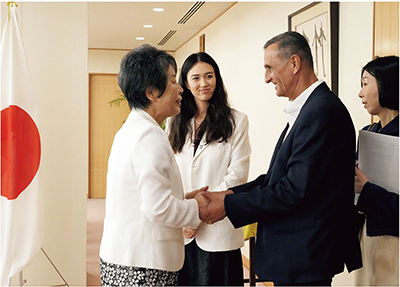 Foreign Minister Kamikawa receives rescued hostages and hostage families (August 22, Tokyo)
Foreign Minister Kamikawa receives rescued hostages and hostage families (August 22, Tokyo)(3) Palestine
Based on the 1993 Oslo Accords and other agreements, the Palestinian Authority (PA) began self-rule in the West Bank and Gaza Strip from 1995. Prime Minister Abbas assumed office as president after the presidential elections held in 2005. Following this, relations between the Fatah led by the president and Hamas deteriorated, and Hamas seized control of the Gaza Strip by military force. In 2017, an agreement in principle was reached through Egyptian mediation to transfer authority in Gaza to the Palestinian Authority. In 2022, through Algerian mediation, the Algiers Declaration, a reconciliation document between Palestinian factions, was signed, which includes the holding of Palestinian Legislative Council elections within one year. In July 2024, representatives of 14 Palestinian factions, including Fatah and Hamas, gathered in Beijing for reconciliation talks and issued the Beijing Declaration. However, a state of division remains as Fatah takes control in the West Bank and Hamas controls Gaza.
In 2024, nine countries formally recognized Palestine as a state: Barbados, Jamaica, Trinidad and Tobago, the Bahamas, Norway, Spain, Ireland, Slovenia, and Armenia.
Regarding Japan's relations with Palestine, State Minister for Foreign Affairs Tsuji visited Palestine in February and met with President Mahmoud Abbas and Prime Minister Mohammad Shtayyeh. In addition, Foreign Minister Kamikawa held a telephone conversation with Prime Minister, and Minister of Foreign Affairs Mohammad Mustafa, immediately after the inauguration of the new cabinet in April. Foreign Minister Iwaya also held a telephone call with him in October.
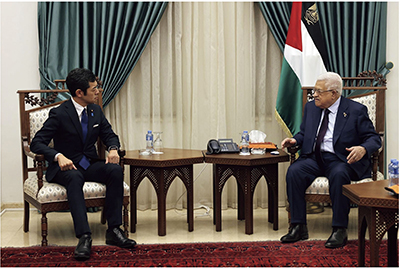 State Minister for Foreign Affairs Tsuji pays a courtesy call on Palestinian President Abbas (February 28, Palestine)
State Minister for Foreign Affairs Tsuji pays a courtesy call on Palestinian President Abbas (February 28, Palestine)(4) Afghanistan
Located at the nexus of the Middle East, Central Asia, and South Asia, Afghanistan is a geopolitically important country that has historically been a crossroads of various religions, cultures, and ethnic groups.
The Taliban seized control of the capital, Kabul, in August 2021, and announced formation of a “transitional government” the following month, but there are still concerns about a lack of ethnic and religious inclusiveness, as well as ongoing significant restrictions on the rights of women and girls, including access to education and employment. The international community has expressed serious concerns over the August 2024 promulgation of the so-called “vice and virtue law,” based on their particular interpretation of Islam, which severely restricts the conduct of the people.
Also, the United Nations Office on Drugs and Crime (UNODC) has reported that production of poppy, a raw material for illegal drugs that has historically been widely cultivated in the country, has declined significantly, partly due to the Taliban's control of poppy production after 2022. The challenge is whether poppy farmers can be led to move away from illegal drug cultivation and toward legitimate alternative livelihoods.
Although security has improved, sporadic terrorist attacks by groups affiliated with the Islamic State of Iraq and the Levant (ISIL) (Khorasan Province) have occurred in various places, and there are concerns that these will have an impact outside the region. Against this backdrop, Japan continues direct engagement with the Taliban and call on them to promote the social and political participation of all Afghan citizens, including women and social minorities, the elimination of restrictions, and the building of constructive relations with the international community, to prevent Afghanistan from becoming once again a hotbed of terrorism and isolation from the international community as it was in the 1990s. Regarding the human rights situation in Afghanistan, Japan expressed deep concern over the Taliban's promulgation of the so-called “vice and virtue law” in a statement by Press Secretary in August. Japan has also actively contributed to discussions on the international stage. In 2024, as in the previous year, Japan continued to serve as a non-permanent member of the UN Security Council and as the penholder(2) regarding the situation in Afghanistan, drafting and coordinating relevant resolutions, and contributing to the unanimous adoption of UNSC Resolution 2727, which renewed the mandate of the United Nations Assistance Mission in Afghanistan (UNAMA), as well as issuing Security Council press statements on the situation in Afghanistan.
According to a UN announcement, approximately half of the country's population needs humanitarian assistance, and Japan has continued to provide humanitarian assistance and support for basic human needs (minimum requirements for a basic human life) through international organizations even after the Taliban took control of Kabul. In 2024, Japan provided emergency relief goods through JICA in response to the massive flood damage that occurred in Northern Afghanistan in May. In December, Japan made the decision to provide additional assistance of approximately 27.5 million U.S. dollars in the FY2024 supplementary budget.
- (2) Refers to the member states that lead discussions on specific agenda items and draft documents such as resolutions and statements by the chair in the Security Council.
(5) Iran
Iran is a major Shiite regional power with a population of about 85 million that boasts abundant natural resources.
Japan has developed a traditionally friendly relationship with Iran for more than 90 years.
Iran held a presidential election a year earlier than planned after a helicopter carrying President Seyyed Ebrahim Raisi and others crashed in May, killing all on board. In the runoff election held on July 5, Dr. Masoud Pezeshkian was elected as the next president, and the Presidential Inauguration Ceremony was held on July 30. State Minister for Foreign Affairs TSUGE Yoshifumi attended the Inauguration Ceremony as a special envoy of Prime Minister Kishida. In addition, on July 22, Prime Minister Kishida held a telephone call with President-elect Pezeshkian, expressing his high hope for Iran to play a more constructive role towards the peace and stability of the Middle East and to advance cooperation with the international community.
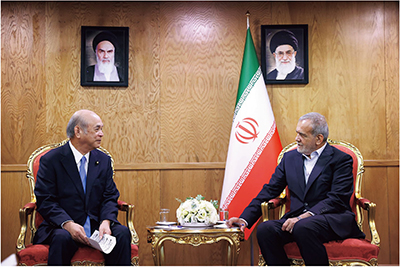 State Minister for Foreign Affairs Tsuge (Special Envoy of the Prime Minister) pays a courtesy call on Iranian President Pezeshkian (July 30, Tehran, Iran)
State Minister for Foreign Affairs Tsuge (Special Envoy of the Prime Minister) pays a courtesy call on Iranian President Pezeshkian (July 30, Tehran, Iran)Against the backdrop of the situation in Gaza from October 2023, the exchange of fire between Lebanon's Hezbollah and Israel has intensified. On April 1, 2024, a facility linked to the Iranian embassy in Damascus, the Syrian capital was destroyed by a missile attack, resulting in casualties. Later that month on the 13th, Iran launched its first large-scale attack on Israeli soil, using drones and ballistic missiles, increasing tensions between Israel and Iran.
On October 1, Iran launched another large-scale ballistic missile attack against Israel, citing the killing of Hezbollah's Secretary-General Hassan Nasrallah in an Israeli attack in Lebanon on September 27, 2024, among other reasons.
In response, Israel launched attacks on military facilities in Iran on October 26. In response to these developments, Japan, through statements by the foreign minister as well as other means, expressed strong condemnation of any action that would escalate the situation in the Middle East and urged all parties involved to de-escalate the situation. Japan has also urged both Iran and Israel to exercise maximum restraint.
In the context of Russia's aggression against Ukraine, there continues to be concerns in the international community about growing military cooperation between Iran and Russia.
Regarding the nuclear issue, following the U.S.'s withdrawal from the Joint Comprehensive Plan of Action (JCPOA), Iran has taken steps to undermine its commitment to the JCPOA since July 2019. As of the end of 2024, Iran has produced uranium enriched up to 60%, left parts of safeguard issues unresolved, suspended the implementation of the Additional Protocol that allowed unannounced inspections by the International Atomic Energy Agency (IAEA), and has withdrawn the designation of some IAEA inspectors of certain nationalities. The Pezeshkian administration, which took office in August, has shown an eagerness to engage in dialogue with European countries and the U.S., but Iran has yet to return to complying with its commitments under the nuclear agreement. Japan calls for Iran to respond constructively, including by cooperating fully and without delay with the IAEA, with a view to rebuilding the nuclear agreement.
Japan is an ally of the U.S. while also maintaining good relations with Iran for many years, supporting Iran's efforts to assist Afghan refugees and the development of a system for preserving wetlands in Lake Urmia and the surrounding area. Foreign Minister Kamikawa held a telephone call with Foreign Minister Hossein Amir-Abdollahian in April, Acting Foreign Minister Ali Bagheri Kani on August 15, and with Foreign Minister Seyyed Abbas Araghchi on August 28. Foreign Minister Kamikawa also met with Foreign Minister Araghchi while she was visiting New York, U.S., in September. Additionally, Foreign Minister Iwaya held a telephone call with Foreign Minister Araghchi in October. In addition to these high-level meetings, a Japan-Iran Vice-Ministerial Consultation was held in December. Japan has been making its own diplomatic efforts to ease tensions and stabilize the situation in the Middle East by directly communicating its concerns to Iran on various issues at every opportunity, while continuing these multilayered dialogues with Iran at various levels.
(6) Türkiye
Türkiye is an important regional power in various respects, including its geopolitical significance. As a member of the North Atlantic Treaty Organization (NATO), Türkiye plays a significant role in regional security while proactively pursuing multifaceted diplomacy with Europe and the U.S., Russia, and countries in the Middle East, Asia, and Africa. Türkiye has traditionally maintained a close friendship with Japan, as epitomized by episodes such as the Ertuğrul Frigate incident in 1890.
In February 2023 a major earthquake struck southeastern Türkiye, killing more than 50,000 people. In addition, with inflation putting pressure on the lives of citizens, President Recep Tayyip Erdoğan was re-elected in the presidential election in May that year. In the subsequent local election in March 2024, President Erdoğan's Justice and Development Party (AKP) suffered its first defeat to the opposition since its founding.
On the diplomatic front, while focusing on Europe and the U.S., Türkiye has pursued a multifaceted diplomatic policy that strengthens relations not only with neighboring countries but also with Latin America and Africa. Regarding the situation in the Gaza Strip, Türkiye initially showed a willingness to mediate diplomacy, but as the situation escalated, it has adopted a stance of criticizing Israel and defending Hamas, while also actively providing humanitarian assistance to the people of Gaza.
Various dialogue frameworks exist between Japan and Türkiye. In 2024, a meeting of the Japan-Türkiye Maritime Dialogue was held to exchange views on maritime issues, including the maintenance and development of the maritime order based on the rule of law, as well as discussions on the situation in the East China Sea, South China Sea, and the maritime areas around Türkiye. Both sides affirmed their intention to continue regular exchanges of views between the two countries in the future.
The year 2024 marked the 100th anniversary of the establishment of diplomatic relations between Japan and Türkiye. In addition to high-level visits, including Foreign Minister Kamikawa's visit to Türkiye in January, commemorative events were held throughout both countries. In June, Türkiye's Navy corvette TCG KINALIADA made port calls to Kushimoto (Wakayama Prefecture), Tokyo, and Kure (Hiroshima Prefecture), where it took part in events such as a memorial ceremony for the Ertuğrul Frigate incident. In August, the Japanese Maritime Self-Defense Force's training ships Kashima and Shimakaze called at Istanbul as part of their long-distance training voyage to commemorate the 100th anniversary of ties. In September, the Japan-Türkiye Disaster Preparedness Seminar was held in Istanbul, where both countries shared their knowledge and expertise through reports on their responses to the Southeast Türkiye Earthquake and the Noto Peninsula Earthquake.
 Special stamp issued on August 6, 2024, for the “100th anniversary of the establishment of diplomatic relations between Japan and Türkiye”
Special stamp issued on August 6, 2024, for the “100th anniversary of the establishment of diplomatic relations between Japan and Türkiye”(7) Iraq
After the Iraq War in 2003, Iraq enacted a new constitution in 2005, and a government formed through democratic elections is now in charge of running the country.
On the domestic political front, a state of confusion continued after the election for the Iraqi Council of Representatives elections in 2021, with no cabinet being able to be formed. However, since the new government was formed in October 2022, Prime Minister Mohammed Al-Sudani has been running a stable administration with the support of a wide range of political forces. In June 2023, the budget law covering the three fiscal years from 2023 to 2025 came into effect, ensuring budgetary stability and administrative continuity. In October 2024, a Parliamentary Election for the Kurdistan Region was held for the first time in six years, and in November, a national census was conducted for the first time in 37 years since 1987.
Following the inauguration of the Al-Sudani administration, domestic security in Iraq has improved significantly. However, since October, the situation in Israel and Palestine has affected the situation in Iraq, with successive attacks conducted on U.S. military facilities in Iraq by pro-Iranian militia groups calling themselves the “Islamic Resistance in Iraq,” and U.S. forces launching counterattacks against the pro-Iranian militia groups.
On the diplomatic front, Iraq is located between the regional powers of Iran, Saudi Arabia, and Türkiye, and is seeking to strengthen relations with neighboring countries and pursue a balanced diplomacy.
Since 2003, Japan has consistently provided support to Iraq, including economic cooperation worth approximately 14.2 billion U.S. dollars (as of the end of 2024).
(8) Jordan
The situation in Jordan remains relatively stable compared to other parts of the persistently turbulent Middle East region. Jordan has, under the leadership of King Abdullah II, played a vital role in promoting the peace and stability of the region, such as with countermeasures against extremists, its acceptance of a large number of Syrian and Palestinian refugees, and active involvement in peace in the Middle East. The international community highly values Jordan's contributions. Jordan and Japan have longstanding friendly ties, and the relationship between the two countries was elevated to a strategic partnership in 2018, maintaining a consistently close relationship.
The year 2024 marked the 70th anniversary of diplomatic relations between Japan and Jordan and was commemorated with events held at various levels, involving both public and private sectors of both countries. Of note, in response to rising tensions throughout the Middle East region, including the situation in Gaza, there was close communication between leaders and foreign ministers. In addition to holding a Summit Meeting with Prime Minister and Minister of Defense Bisher Hani Al-Khasawneh when he visited Japan in February, Prime Minister Kishida also held a summit telephone call with King Abdullah II ibn Al Hussein in September, during which they exchanged views on the latest situation and confirmed close cooperation between both countries. At the foreign ministerial level, Foreign Minister Kamikawa paid a courtesy call on Prime Minister and Defense Minister Al-Khasawneh in February, held a Japan-Egypt-Jordan Foreign Ministers' Meeting in New York in September, and held several telephone calls with the foreign minister. Furthermore, immediately after taking office in October, Foreign Minister Iwaya held a telephone call with Deputy Prime Minister and Minister of Foreign Affairs and Expatriates Ayman Safadi, in which they exchanged views on the regional situation, including the situation in Lebanon, where tensions have risen sharply, and requested cooperation in protecting Japanese nationals. Foreign Minister Safadi responded by saying that he would spare no effort in cooperating to ensure the safety of Japanese nationals. Thanks to this close communication, the following day, a Self-Defense Force aircraft transported Japanese nationals and others from Lebanon to Jordan without incident.
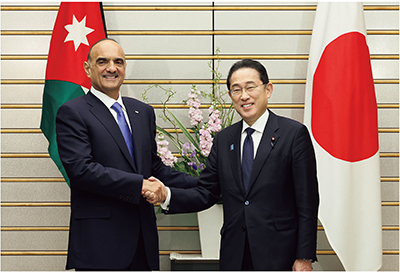 Japan-Jordan Summit Meeting (February 16, Tokyo; Photo: Official Website of the Prime Minister of Japan and His Cabinet))
Japan-Jordan Summit Meeting (February 16, Tokyo; Photo: Official Website of the Prime Minister of Japan and His Cabinet))Furthermore, Prince El Hassan bin Talal and Princess Sarvath El Hassan visited Japan in November, during which a reception commemorating the 70th anniversary of relations was hosted by the Embassy of Jordan in Japan and served as a symbol of the traditional relationship between the imperial and royal families of the two countries. In terms of security, the cooperative relationship between the two countries in the field of defense is becoming even closer, with Vice Chief of Staff of the Joint Staff of the Self-Defense Forces NAGUMO Kenichiro visiting Jordan in February and Major General Yousef Al-Hnaity, Chairman of the Joint Chiefs of Staff of the Jordan Armed Forces, visiting Japan in November.
(9) The Gulf States and Yemen
In recent years, the Gulf States have been working on socioeconomic reforms with decarbonization and industrial diversification as key issues. The Gulf States are important partners for Japan from the perspective of energy security and other factors. In addition, Japan is promoting cooperation in a wide range of areas through frameworks such as “Japan-Saudi Vision 2030” with Saudi Arabia and the “Comprehensive Strategic Partnership Initiative (CSPI)”with the United Arab Emirates (UAE), based on the view that these reforms will contribute to the long-term stability and prosperity of the Middle East. In addition, regarding the negotiations for Japan-Gulf Cooperation Council (GCC)(3) Economic Partnership Agreement (EPA), which had been suspended since 2009, the first round of negotiations after the resumption was held in Riyadh, Saudi Arabia in December.
Saudi Arabia plays a leading role in the Organization of the Petroleum Exporting Countries (OPEC) and is an important energy security partner, supplying about 40% of Japan's crude oil imports. It is also the only Arab member of the G20 and is the leader of the Arab Islamic world, home to two of Islam's holiest sites. In response to rising tensions in the Middle East since October 2023, Saudi Arabia has played a leading role in foreign policy discussions among Arab and Islamic countries, including by hosting the Arab-Islamic Summit (a joint summit by the League of Arab States and the Organization of Islamic Cooperation (OIC)) and the Global Alliance for Implementation of the Two-State Solution meeting. Furthermore, under “Saudi Vision 2030,” the country is promoting new initiatives in various fields with the aim of comprehensive socio-economic reforms. Through various talks, including a video teleconference meeting between Prime Minister Kishida and Prince Mohammed bin Salman bin Abdulaziz Al-Saud, Crown Prince and Prime Minister in May, a telephone call between Prime Minister Ishiba and Prince Mohammed bin Salman bin Abdulaziz Al-Saud, Crown Prince and Prime Minister in November, a telephone call between Foreign Minister Kamikawa and Minister of Foreign Affairs Faisal bin Farhan Al-Saud in May, and a telephone call between Foreign Minister Iwaya and Minister of Foreign Affairs Faisal bin Farhan Al-Saud in October, the two countries confirmed their intention to strengthen their strategic partnership and to further promote cooperation in various fields under the framework of the Japan-Saudi Vision 2030, as well as working closely together in the international arena toward the stabilization of the region and the international community.
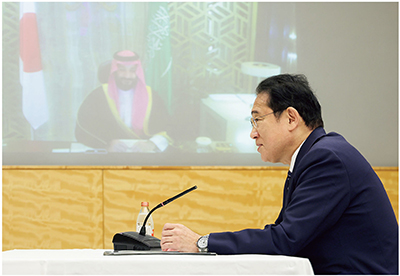 Japan-Saudi Arabia Summit Video Teleconference Meeting (May 21, Tokyo; Photo: Official Website of the Prime Minister of Japan and His Cabinet)
Japan-Saudi Arabia Summit Video Teleconference Meeting (May 21, Tokyo; Photo: Official Website of the Prime Minister of Japan and His Cabinet)The UAE is also an important partner in terms of energy security, supplying approximately 40% of Japan's crude oil imports. Through the visit to Japan by Minister of Industry and Advanced Technology and Special Envoy to Japan Sultan Al Jaber in July, and a telephone call between Foreign Minister Iwaya and Minister of Industry and Advanced Technology and Special Envoy to Japan Sultan Al Jaber in December, both sides confirmed that they would further promote cooperation in various fields under the framework of the “CSPI” and cooperation under the Japan-UAE Innovation Partnership and the Global Green Energy Hub initiative to strengthen the comprehensive strategic partnership between the two countries. In September, the leaders of Japan and the UAE announced the launch of the negotiations for a Japan-UAE Economic Partnership Agreement (EPA), and the first meeting was held in Tokyo in November. In addition, in the defense field, the Agreement between the Government of Japan and the Government of UAE concerning the Transfer of Defense Equipment and Technology, which was signed in May 2023, entered into force in January 2024.
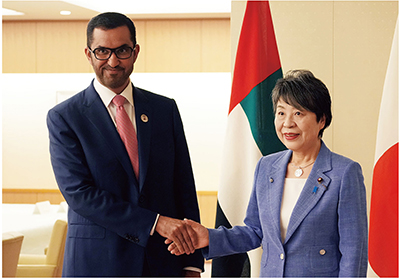 Meeting between Foreign Minister Kamikawa and Minister of Industry and Advanced Technology and Special Envoy to Japan of UAE Jaber (July 4, Tokyo)
Meeting between Foreign Minister Kamikawa and Minister of Industry and Advanced Technology and Special Envoy to Japan of UAE Jaber (July 4, Tokyo)Qatar is one of the world's largest gas-producing countries, and it has been increasing its presence by leveraging its own channels with Iran, the Taliban, Hamas, and others to mediate peace talks between the U.S. and the Taliban, negotiations over the exchange of detainees between the U.S. and Iran, and ceasefire and hostage release negotiations between Israel and Hamas. Through the Policy Dialogue between the Ministries of Foreign Affairs of Japan and Qatar held in November, the two countries confirmed to strengthen cooperation in a wide range of areas, including politics, economy, and defense exchanges, under the “Strategic Partnership” confirmed between Prime Minister Kishida and Amir of Qatar, Sheikh Tamim Bin Hamad Al-Thani in 2023.
Oman leveraged its own channels with Iran and the Houthis to mediate negotiations on the normalization of diplomatic relations between Saudi Arabia and Iran, negotiations between Saudi Arabia and the Houthis, and negotiations on the exchange of detainees between the U.S. and Iran. The Japan Maritime Self-Defense Force made a port call in Oman and conducted at-sea training, advancing cooperation and exchange between the two countries in a wide range of areas, including maritime security.
Kuwait is a strong partner with Japan, supplying approximately 9% of its crude oil imports. Through the Policy Consultations Meeting between the Ministries of Foreign Affairs of Japan and the State of Kuwait in December and other meetings, the two countries exchanged views on their cooperative relationship in a wide range of areas including bilateral cooperation in political, the economic, energy, cultural fields, strengthening of bilateral contact and exchanges, as well as cooperation in the international arena. The two countries confirmed to collaborate toward stabilizing the regional and international community.
Bahrain is home to the U.S. Naval Forces Central Command, the U.S. Fifth Fleet, making it an important partner for Japan in terms of ensuring the safety of Japanese-related ships in the Middle East and stabilizing the region. Japan and Bahrain confirmed that they would enhance cooperation to maintain and strengthen the rule of law through bilateral communications such as a telephone call between Foreign Minister Kamikawa and Minister of Foreign Affairs Abdullatif bin Rashid Al Zayani in April.
Stability in Yemen is important not only for the peace and stability in the Middle East as a whole, but also from the perspective of securing sea lanes, which are directly related to Japan's energy security. In Yemen, the Houthis had continued to fight against the Government of Yemen and the Arab Coalition. After a nationwide ceasefire in April 2022, a lull has continued despite the ceasefire expiring in October of the same year. In 2023, several rounds of direct talks between Saudi Arabia and the Houthis, mediated by Oman, have been held, showing positive moves toward a lasting peace in Yemen. However, in response to the situation in the Gaza Strip, in November 2023, the Houthis, who stand in solidarity with Hamas, declared that they would attack vessels related to Israel and “seized” a Japan-related vessel in the Red Sea off the coast of Yemen, and continue to carry out attacks against vessels in the Red Sea and the Gulf of Aden. Japan firmly condemns these actions by the Houthis, calls for them to refrain from any actions that impede the free and safe navigation of ships, and is working in cooperation with relevant countries to achieve the early release of Japanese-related ships and crew members, and to stabilize the surrounding waters. In 2024, the UN Security Council adopted the resolutions 2722 and 2735 in January and June respectively, co-sponsored by Japan and the U.S. to demand an immediate cease of all attacks by the Houthis against vessels in the Red Sea. Furthermore, in November, Japan and the U.S. led the Security Council in issuing a press statement condemning in the strongest terms the attacks on commercial vessels by the Houthis. Due to the protracted conflict, Yemen is facing a severe humanitarian situation that has been described as “one of the worst in the world.” Since 2015, Japan has cooperated with international organizations to provide humanitarian assistance to Yemen totaling approximately 460 million U.S. dollars (as of the end of 2024).
- (3) Gulf Cooperation Council (GCC): Established in 1981 by Saudi Arabia, the United Arab Emirates (UAE), Bahrain, Oman, Qatar and Kuwait. Its purpose is to promote coordination, integration, and cooperation among participating countries in all fields, including defense and economy.
(10) Syria
A Changes in the situation
The Syrian crisis, ongoing since March 2011 for approximately 13 years, shows no prospect of stabilization nor political resolution. The Constitutional Committee, established in 2019 through UN mediation to bring together the Assad administration and dissidents, has not convened for over a year.
In foreign relations, while Syria maintains cooperative relations with Russia and Iran, both of which supported the Assad administration, it was decided at an extraordinary meeting of Arab League Foreign Ministers on May 7, 2023, to reinstate Syria as a member as part of its efforts to improve relations with Arab countries that have been observed in recent years. Meanwhile, European countries and the U.S. remain cautious about resuming relations with the Government of Syria due to the Assad administration's use of chemical weapons and human rights violations.(4)
On the military and security front, the worsening situation in Gaza since October 2023 and Israel's expanded attacks on the Lebanese pro-Iranian militia group Hezbollah since mid-September 2024 have also had an impact on the situation in Syria, including increased attacks on Syria, which acts as a supply base for Hezbollah. Meanwhile, opposition forces led by Hay'at Tahrir al-Sham (HTS) began taking control of the northern city of Aleppo around November 27, and on December 8 they declared that they had taken control of the capital, Damascus. The following day, the Government of Russia announced that President Assad had fled into exile to Russia. On the 10th, HTS declared the establishment of a “caretaker government” in Damascus and announced that a transition to a new government was scheduled to take place by March 1, 2025. The “caretaker government” also announced its intention to disband all opposition organizations and integrate them into a national army directly under the Ministry of Defense, as well as prospects for holding a national dialogue and drafting a new constitution. Also, on December 15, Israel approved a plan to double the population of the Golan Heights and advanced into the buffer zone of the Golan Heights. Meanwhile, Türkiye and Arab and Western countries have visited Syria and initiated contact with the “caretaker government.”
Regarding the humanitarian situation, the major earthquake that occurred in the southeastern part of Türkiye on February 6 in 2023 also caused extensive damage in Syria, mainly in the north (with more than 5,900 casualties). The number of people in need of humanitarian assistance in Syria is said to reach 16.7 million in 2024, and the number of internally displaced persons exceeded 7.2 million. In addition to various long-term challenges, the intensification of conflict in Lebanon since mid-September 2024 has resulted in a large number of refugees and returnees from Lebanon to Syria. As of November 12, that number has reached approximately 530,000, indicating that humanitarian needs are the highest since the crisis began.
- (4) The state's power violates the fundamental human rights of the people guaranteed by the Constitution.
B The Government of Japan's Efforts
Japan strongly hopes that the violence in Syria will cease as soon as possible and that all Syrians will be able to enjoy fundamental human rights, dignity, freedom, and prosperity. Japan believes that the future of Syria should be determined by the Syrian people themselves and therefore looks forward to a peaceful and stable transition of power in Syria. In particular, Japan calls on all parties concerned to fully respect the will of the Syrian people, and to play a constructive role in promoting comprehensive political settlement and national reconciliation, through dialogue among the Syrian people, and ultimately peace and prosperity in the region, based on UN Security Council Resolution 2254. In response to the situation in Lebanon since mid-September, Japan provided a new Emergency Grant of 10 million U.S. dollars through UN agencies on October 29 to people who fled from Lebanon to Syria. Japan's total humanitarian assistance to Syria and neighboring countries since 2012 has amounted to more than 3.5 billion U.S. dollars.
(11) Lebanon
Faced with various challenges due to the complex crisis, Lebanon has been in a political vacuum since the end of former President Michel Aoun's term at the end of October 2022, with no conclusion reached in parliamentary talks due to conflicts among political forces and a new president yet to be elected. Administrative and financial reforms outlined in the working-level agreement with the International Monetary Fund (IMF) are significantly delayed, and the economic crisis is dragging on, with public services not functioning and high inflation. Since October 2023, the situation in Gaza has affected Lebanon through the exchanges of fire between Israel and Hezbollah and others in the southern part of the country bordering Israel. Furthermore, since mid-September, Israel has conducted large-scale air strikes in Dahieh in the southern suburbs of Beirut, as well as in southern and eastern Lebanon. This resulted in one million people being displaced within the country. On November 26, the Israeli and Lebanese governments agreed to a ceasefire through the mediation of the U.S. and France. Japan welcomes this ceasefire agreement and strongly demands all parties take all measures to fully implement the ceasefire agreement, including the full implementation of UN Security Council resolution 1701, and commit to regional stability. On January 9, 2025, a parliamentary session was convened to elect a president, and Commander of the Lebanese Armed Forces, General Joseph Aoun, was elected as the 14th president. The election of a president after more than two years of political vacuum can be seen as an important step toward the country's stability and development.
Japan has provided a total of more than 290.9 million U.S. dollars in assistance to Lebanon (including broad-based assistance) since 2012. In addition, in response to the deteriorating humanitarian situation, on October 21, Japan provided an additional Emergency Grant of 10 million U.S. dollars through UN agencies and other organizations. In October, Foreign Minister Iwaya held a telephone call with Minister of Foreign Affairs and Emigrants Abdallah BouHabib, where the two countries confirmed that they would continue to work together to calm the situation in the region and in Lebanon.

In 2024, Japan and Türkiye celebrated the 100th anniversary of the establishment of diplomatic relations. On August 6, 1924, the year after the founding of the Republic of Türkiye, the diplomatic relations between the two countries were established following Japan's ratification of the Treaty of Lausanne and its entry into force. Türkiye was the first country in the Middle East where a Japanese Embassy was established (in 1925), demonstrating the great importance Japan has placed on Türkiye since that time.
Japan and Türkiye went through the difficult time of World War II. However, as Türkiye entered the war in its final stages, and the two countries did not engage in combat, their friendly relations remained largely unaffected. After the war, when Japan achieved membership in the United Nations (UN) in 1956, Türkiye appealed in the discussion of the UN Security Council, stating that “The admission of Japan, a great country, to the United Nations will make a remarkable contribution to the preservation of peace and cooperation in the international community,” and explained the importance of Japan's UN membership to other countries, devoting their utmost efforts to help Japan return to the international community.
In recent years, Japan-Türkiye relations have been increasingly developing across a wide range of fields, including politics, the economy, disaster risk reduction, and culture. The Second Bosphorus Bridge, the first structure in Türkiye to incorporate a seismic isolation system, was constructed with Japanese yen loans. The Marmaray subway tunnel, which is said to have fulfilled a 150-year-old dream for Istanbul, was also built with Japanese financial assistance. Moreover, in the face of natural disasters such as the Marmara Earthquake in 1999, the Great East Japan Earthquake in 2011, and more recently the earthquake in southeastern Türkiye in February 2023, Japan and Türkiye have supported each other through difficult situations, in keeping with the proverb “A friend in need is a friend indeed.”
 A joint performance of Turkish folk dance and a Japanese drum (wadaiko) group (December, Istanbul, Türkiye)
A joint performance of Turkish folk dance and a Japanese drum (wadaiko) group (December, Istanbul, Türkiye)In 2024, marking the 100th anniversary of the establishment of diplomatic relations, high-level exchanges were conducted, including the visits to Türkiye by Foreign Minister Kamikawa and Parliamentary Vice-Minister for Foreign Affairs FUKAZAWA Yoichi in January, and Special Advisor to the Prime Minister ISHIHARA Hirotaka in May, as well as a visit by Their Imperial Highnesses Crown Prince and Crown Princess Akishino in December. In addition, in June, the Turkish Navy vessel TCG KINALIADA made port calls in Japan over a two-month period. In Kushimoto Town, Wakayama Prefecture, one of its ports of call, a memorial ceremony was held for the Turkish Ertuğrul Frigate, which was wrecked off the coast of Oshima Island in the same town 134 years ago. On the occasion of the 100th anniversary, in addition to looking back on the history of friendship, both countries implemented commemorative projects at various levels in both public and private sectors. As a conclusion to these projects, a commemorative concert was held in Istanbul in the presence of Their Imperial Highnesses Crown Prince and Crown Princess Akishino, featuring a collaboration performance of Turkish folk dance and a Japanese drum (wadaiko) group. The event was a remarkable collaboration of the two countries' traditions and cultures, generating great excitement, and these projects concluded with the support of many people from both Japan and Türkiye. Japan intends to continue to further deepen relations with Türkiye and the ties between the two peoples.

